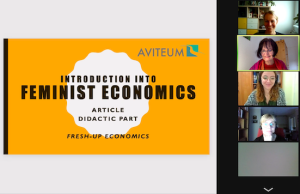They are like a „conversation salon“ as we know it from the age of enlightenment. Our regular online meetings. This time, the Czech and Estonian colleagues presented their contributions to the learning platform. Feminist economics is seen in contrast to the neoclassical school of economics. The difference in the view of human beings is particularly striking. Neoclassical economists start from the assumption of “homo economicus“, who always makes rational decisions, is free of any social influence, pursues his interests and has unlimited needs. Feminist economists, on the other hand, assume that human beings are relational ones who are shaped by various influences such as gender, age, social status, values, and so on. Accordingly, people’s decisions would be influenced by various factors – if only because of unequal starting points.
Economic growth and sustainability – is that possible? What is it about “green growth”, “de-growth” or “social limits to growth”? And what does “decoupling” mean? What are the different approaches to sustainability? A topic that can provoke lively debates. The colleagues brought their knowledge to the table. For example, the reference to the growth dilemma or to a socially acceptable, sustainable “degrowth” of economic development.
Time and again, methodological questions came up: Are the statements clear enough and easy to grasp? Does clarity come at the expense of complexity? How can both be combined in a meaningful way – if only to enable a diversity of perspectives? But without confusing?
Not exactly in a dignified salon atmosphere, but it was a cultivated exchange this time too, factual, carried by respect and the interest in learning new things.

